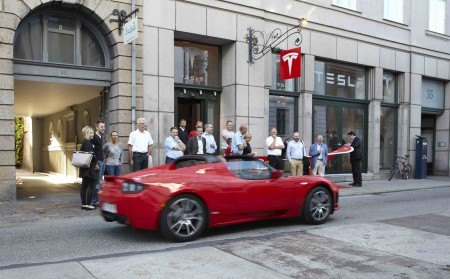QOTD: Doing Without Dealers, Part II
Last week, a Massachusetts judge sided with Tesla regarding factory-owned stores, in a suit brought by Massachusetts State Automobile Dealers Association and an assortment of dealers. Barring an appeal, the ruling essentially clears the way for Tesla to operate their own outlets – some of which are in non-traditional venues like shopping malls – and offer an online reservation system for vehicles.
The ruling brings into question the very nature of the independent dealer model, the laws that currently protect it, and its sustainability. OEMs have experimented with venues that merely act as showrooms, rather than ones that sell cars, as well as outlets that blur the line between an “experience center” and a factory store – the most recent example being the Chrysler pseudo-factory “Motor Village” in California.
Tesla, for one, uses the online ordering system to skirt the dealer franchise laws in various states, since they are not technically selling cars there. But that didn’t stop dealer groups from suing them anyways. Robert O’Koniewski, the Massachusetts State Automobile Dealers Association Executive Vice-President, claimed that the group did have standing to sue Tesla, because
“If you read the statute, it’s pretty clear: A factory cannot own a store, and a dealer can sue for injunctive relief if they feel the public is being harmed.”
Now, we’re faced with a few questions
1) What constitutes a “factory owned store”, and did Tesla knowingly operate in a manner not consistent with the definition of a “factory owned store”?
2) Was the public being harmed?
3) What impact will this have on OEMs and their decision to operate outside of the traditional dealer network?
I will leave numbers 1 and 3 up to you, the B&B, because I am not well versed in the intricacies of U.S. franchise law, and many of you have real-world experience at the dealer level. As for number 2, I’d say “probably not”. But O’Koniewski does seem to think that the dealers are being harmed, and sounds rather desperate when discussing the matter just a few months earlier.
More by Derek Kreindler
Latest Car Reviews
Read moreLatest Product Reviews
Read moreRecent Comments
- Jalop1991 Nissan is Readying a Slew of New Products to Boost Sales and ProfitabilitySo they're moving to lawn and garden equipment?
- Yuda I'd love to see what Hennessy does with this one GAWD
- Lorenzo I just noticed the 1954 Ford Customline V8 has the same exterior dimensions, but better legroom, shoulder room, hip room, a V8 engine, and a trunk lid. It sold, with Fordomatic, for $21,500, inflation adjusted.
- Lorenzo They won't be sold just in Beverly Hills - there's a Nieman-Marcus in nearly every big city. When they're finally junked, the transfer case will be first to be salvaged, since it'll be unused.
- Ltcmgm78 Just what we need to do: add more EVs that require a charging station! We own a Volt. We charge at home. We bought the Volt off-lease. We're retired and can do all our daily errands without burning any gasoline. For us this works, but we no longer have a work commute.


































Comments
Join the conversation
The franchise laws came about to protect the dealer from anti-competitive practices. The OEM could easily operate a store at a loss, driving the local ownership out, then assume his assets at liquidation prices. I'm baffled by the vitriol of your experiences with your local dealers. My family operated a dual franchise dealership for almost 20 years. Our little town had less than 20,000 people, and as such, everybody knew everybody. When I was 12, I used to drive a local judge to work when he had his Imperial serviced. My Father used to trade a Jeep to the local Cadillac dealer every year so my Mom could drive a Sedan deVille. The point is that we were no different than the local grocer. If your experience has been so detrimental, why not leave, get on the phone and find someone who could do business with you in a manner that allowed some dignity? This adversarial mindset started in the 1950's with a selling technique from a company called Hall-Dobbs Management. They asserted that if you sent enough people at the customer, eventually they'd find a face they liked and buy. The whole let me take your offer to the boss etc. came from these deep thinkers. They came to dinner at our house and my Dad threw them out. My Mother was mortified, yet she agreed that they had to go. Yet, statistically, they were winning. In retrospect, more scrutiny should have gone to looking at the data. I cannot even remember the amount of times we got business from a town 60 miles away with larger population that appreciated being treated with respect. The comment from Buck50 astounded me. Pay more for the same car? Is anyone out there listening? This here interweb thing should be able to help, right?
One question I always had about dealer: For the customers who want cars right away, why not have 10 to 20 cars in inventory rather than 150 to 200? There would not be so much money tied up. Or is the reason for so many unsold cars to keep the line going and they are just using customers as an excuse?